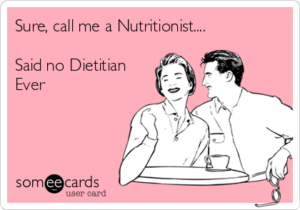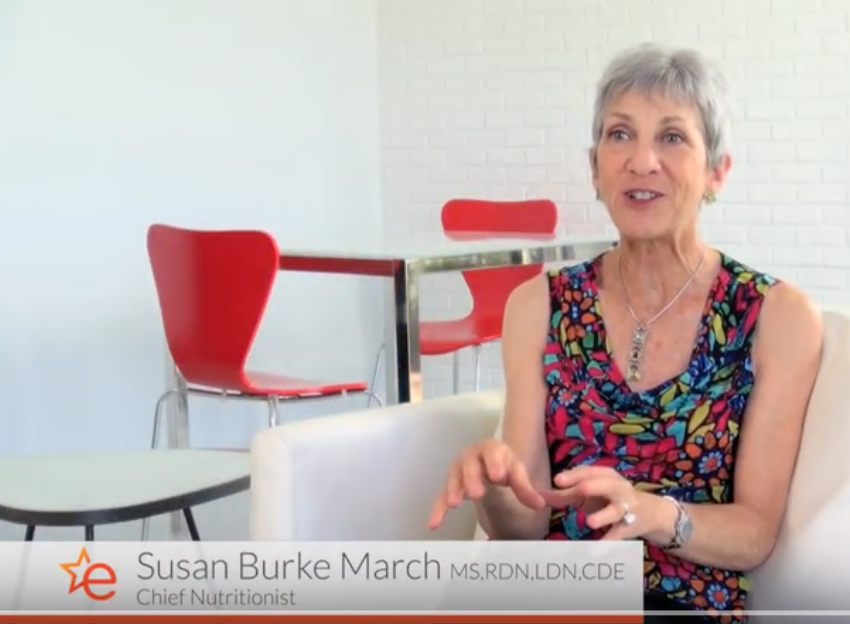Dietitian? Dietician? Nutritionist? What’s the scoop on spelling?
By Susan Burke March
Why is Dietitian spelled with a two t’s and not a c?
Today’s column is about Registered  Dietitian Nutritionists.
Dietitian Nutritionists.
I am a member of the Academy of Nutrition and Dietetics, (AND) formerly known as the American Dietetic Association.
Sylvia Escott-Stump, the Academy President in 2012, noted that a decision to change the name was made to “reflect the members’ background in science and their academic expertise. Nutrition science underpins wellness, prevention, and treatment.”
The Commission on Dietetic Registration, (CDR) the credentialing agency and organization unit of AND writes, “The Academy of Nutrition and Dietetics is the world’s largest organization of food and nutrition professionals founded in Cleveland, Ohio, in 1917, by a visionary group of women dedicated to helping the government conserve food and improve the public’s health and nutrition during World War I. Today, the Academy has over 100,000 credentialed practitioners — [women and men] registered dietitian nutritionists, dietetic technicians, registered, and other dietetics professionals holding undergraduate and advanced degrees in nutrition and dietetics, and students — and is committed to improving the nation’s health and advancing the profession of dietetics through research, education, and advocacy.”
Why dietitian with a ‘t’?Wendy Marcason, RDN, writing in the Journal of the Academy of Nutrition and Dietetics, explains the difference and importance of the spelling of “dietitian.”
“The correct or preferable spelling of dietitian has been a longstanding matter for the profession of dietetics. In 1930, the ADA executive committee at the 13th Annual Meeting considered a variety of issues, one being the official spelling of dietitian with a “t”—and this was the spelling that was adopted.
In 1940, an ADA committee was formed to update the definition of dietitian, which became a person “who had college training in the science of nutrition and management and is proficient in the art of feeding individuals and groups.” A nutritionist in a public agency was a “qualified, professionally trained person who directs or carries on a program of activities dealing with the application of scientific knowledge of nutrition to the prevention of disease and the promotion of positive health.”
The spelling of dietitian continued to be controversial. In 1954, the ADA Courier mentioned that Time Magazine reported: “the word dietitian is among the 20 most misspelled words.”
Moving forward into the early 1960s, dietetic associations, under the auspices of the International Committee of Dietetic Associations (ICDA), worked together to standardize information about dietitians under the International Standard Classification of Occupations. When the International Labour Office confirmed the dietetic profession’s classification in 1967, it also adopted the spelling dietitian at the request of the international dietetic community. Still to this day some dictionaries list dietician as an accepted alternate, but, as noted, the official spelling dating back to 1930 still stands.”
The ICDA writes, “The spelling of dietitian with a “c” does not pre-date spelling as ‘dietitian’ which first appeared in print in 1846. Admittedly, today’s members of the professional community of dietitians do read “dietician” as a misspelling, and one would be hard-pressed to find an example of that spelling in publications put out by that community.”
I was once a RD, but now…
Graduating from City University of New York, Queens College, completing my internship and then passing the certification exam, my official certification began on October 1, 1995, as a Registered Dietitian (RD). In 2010, the AND began exploring the option of offering the registered dietitian nutritionist (RDN) credential. The 2013 joint meeting of the major organizational units (Commission on Dietetic Registration, Accreditation Council for Education in Nutrition and Dietetics, Council on Future Practice, Education Committee, and Nutrition and Dietetics Educators and Preceptors DPG) supported moving forward with the use of the RDN credential. Incorporating nutritionist into the RD credential highlights that “all registered dietitians are nutritionists, but not all nutritionists are registered dietitians.”
Although I am not currently practicing in the United States, to maintain my RDN credentialed status I must renew my membership yearly, and re-apply for certification every five years, and must submit 75 approved continuing education credits (CPEs).
Careers in Nutrition

At the CEDEI School – CATCH training (Coordinated Approach To Child Health)
Here in Cuenca, I’ve volunteered in a number of programs and locations, including for the Casa de la Diabetes, and Cuenca Chamber for Expats. Working with the Mayor’s office Dirección de Relaciones Externas I presented to students about careers in nutrition.
Here in Ecuador, dietistas hold advanced degrees and typically work in clinical settings and in private practice.
In the U.S. dietitians enjoy a number of additional opportunities for educational training and career advancement.
U.S. RDNs traditionally work in health care, food services, and research, and play a primary role in medical nutrition therapy, which involves the use of proper nutrition and therapeutic diets to assist in the prevention and management of health conditions such as obesity, coronary artery disease, diabetes, and cancer.
My first full-time job out of college was in an outpatient senior care clinic. I then worked as Chief Clinical RD at Mt. Sinai Hospital of Queens, New York. While there I collected the data that I needed to write my masters thesis on the nutritional diagnosis of malnutrition of senior patients admitted with a diagnosis of dehydration, and also logged my clinical hours allowing me to sit for the Certified Diabetes Educator credentialing exam (CDE).
Today’s RDNs find fascinating careers in communications, developing marketing and public relation plans; in food businesses, developing new products and recipes; as consultants to chefs and in restaurants and culinary schools; and in private practice, counseling clients and consulting to food service or restaurant managers, food vendors, or distributors.
Most professional and college sports teams and athletes have a RDN on staff. Besides supporting best performance, athletes have special issues with hydration, weight management (both building muscle and making weight). Often, a board-certified sports dietitian will also have a advanced training in exercise physiology — head coaches know that the RDN is an essential member of the coaching team both in- and off-season.

As Chief Nutritionist for online program eDiets.com
Personally, I was one of the first RDNs (2000) to work exclusively online as part of a team that successfully developed one of the first online subscription-based personalized weight and health management programs. My expertise at the time was not in computer programming! But I was an expert in the management of people and projects, and have many stories to tell about this unusual and successful part of my employment history.
The CDR offers board certification in a number of different specialties. Board certification indicates advanced training, experience, and expertise.
- Board Certified Specialist in Pediatric Nutrition (CSP)
- Board Certified Specialist in Renal Nutrition (CSR)
- Board Certified Specialist in Gerontological Nutrition (CSG)
- Board Certified Specialist in Sports Dietetics (CSSD)
- Certified Diabetes Educator (CDE)
- Certified Nutrition Support Dietitian (CNSD)
What we do, and how we do it
I’ve been asked about titles like Registered Holistic Nutritionist, Certified Nutritional Practitioner — I’ve gone into General Nutrition Center vitamin stores and been approached by their “nutritionist” and given unsolicited advice about which dietary supplements to buy (they actually wore a little name tag with the title). These titles are often used by those who have completed privately owned training programs that vary in length and rigor.
Registered Dietitian Nutritionists (RDNs) are food and nutrition experts who have met the following criteria to earn the RDN credential:
- Completed a minimum of a bachelor’s degree at a U.S. regionally accredited university or college and course work accredited or approved by the Accreditation Council for Education in Nutrition and Dietetics (ACEND) of the Academy of Nutrition and Dietetics.
- Completed an ACEND-accredited supervised practice program at a health-care facility, community agency, or a foodservice corporation or combined with undergraduate or graduate studies. Typically, a practice program will run six to 12 months in length.
- Passed a national examination administered by the Commission on Dietetic Registration (CDR). For more information regarding the examination, refer to CDR’s website at www.cdrnet.org.
- Completed continuing professional educational requirements to maintain registration.
Educational requirements
RDNs study a variety of subjects, ranging from food and nutrition sciences, foodservice systems management, business, economics, computer science, culinary arts, sociology and communication to science courses such as biochemistry, physiology, microbiology, anatomy, and chemistry, and organic chemistry.
To practice in the U.S.
Individuals who completed their education and training outside of the US, or received credentials in another country, may be eligible to become credentialed RDNs in the US. It is important to note that all individuals who establish registration eligibility — whether under the provisions of a reciprocity agreement or through the combination of a validated academic degree and supervised practice program — must successfully write the Registration Examination for Dietitians to earn the RDN credential.
Sources
Academy of Nutrition and Dietetics. EatrightPro.com
Academy of Nutrition and Dietetics. Where do you fit? Workplaces that need RDNs.
Commission on Dietetic Registration. Who we are.
Commission on Dietetic Registration. Board Certified Specialist Home.
International Confederation of Dietetic Associations. The “c” in dietitians —a long and fading future (maybe).
Susan Burke March, a Cuenca expat, is a Registered Dietitian Nutritionist and a Certified Diabetes Educator who specializes in smart solutions for weight loss and diabetes-related weight management. She is the author of Making Weight Control Second Nature: Living Thin Naturally — a fun and informative book intended to liberate serial dieters and make healthy living and weight control both possible and instinctual over the long term. Do you have a food, nutrition or health question? Write to her – SusanTheDietitian@gmail.com


















